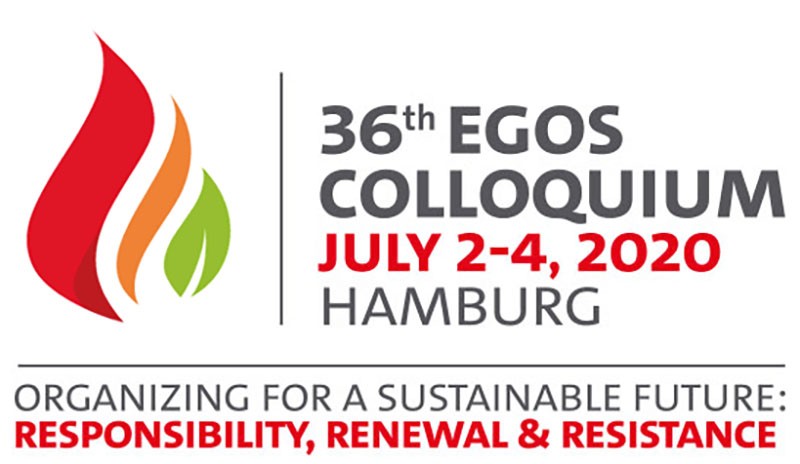Pre-Colloquium Post-Doctoral & Early Career Scholars Workshop 2020
Call for Applications
Paths to a Meaningful Career
The progress of research in organizational studies relies upon the
commitment and the creativity of advanced PhD students, post-doctoral fellows and junior scholars who explore new questions,
new methods and new phenomena. EGOS puts special emphasis on supporting the academic development of younger scholars and their
positioning and integration in the academic community/ies.
The purpose of the EGOS pre-Colloquium Post-Doctoral
& Early Career Scholars Workshop is to facilitate the academic socialization of junior scholars. We aim to provide an
arena for explorations of challenges faced by early career scholars relating to the different dimensions of academic work,
including research (and funding), teaching, administrative duties and community service.
This workshop is
an active exchange, based on a dialogue among junior and senior academics that seeks to strengthen junior scholars’ involvement
with the EGOS community and to help them in finding their ways in academia. It will be taking place on Tuesday, June
30, 2020, prior to the main EGOS Colloquium in Hamburg.
Content and objectives
To
our understanding, the main challenge in an academic career is to balance between personal passions and preferences on the
one hand, and the needs of and pressures from various parties on the other, while sustaining a meaningful career over time.
How do we manage these conflicting demands, and how do we achieve impact and relevance in our careers? These questions nag
any academic, let alone early career scholars, and so we aim to create a space for their discussion.
In 2020, the
pre-Colloquium Post-Doctoral & Early Career Scholars Workshop will focus on presentations, discussions and small-group
workshops dedicated to:
Developing a better understanding of the various dimensions of academic work, their rationale, and their importance in various stages of your academic career.
Reflecting upon your identity and voice as a researcher, an educator and a citizen of various academic communities (e.g. within your institution, EGOS, AoM, etc.), with an opportunity for hands-on exchange about diverse career paths and ways to achieve relevance and impact.
Thinking of your career, and the interplay of serendipity and strategic action in navigating it, including hearing the experiences of senior scholars who will reflect on their career paths, highlighting failures, dead ends and missed opportunities – and what they have learned from them – as much as about what brought them motivation and joy.
Application guidelines
To be considered for participation in the pre-Colloquium Post-Doctoral & Early Career Scholars Workshop
2020, applicants should have completed their doctoral dissertation within the last five academic years (excluding maternity
leave or similar).
Please apply for admission to the workshop by Tuesday, January 14, 2020
at the latest and upload (via the EGOS website) a single PDF file that contains the following information:
A letter of application, containing name, affiliation, postal & e-mail address, as well as an explaining your motivation to participate
An extended abstract (1 page) outlining your main area of work or a current paper project
Your curriculum vitae
An aspirational curriculum vitae, explaining where you would like to see yourself in 10–15 years in terms of your academic achievements and focus. This can be written as a free text or as a list-like CV, as long as you also explain your choices and reflect upon the major challenges you will face in your efforts to move from you current CV to your desired one (max. 2 pages)
Please note!
Participants in the workshop will be selected based on their potential benefit from, and contribution to, the conversations in the workshop.
Applicants will be notified of acceptance by March 1, 2020. Given the interactive nature of the workshop, the number of participants will be limited. Please keep in mind that registration for the workshop must be submitted separately from your registration for the main EGOS Colloquium.
Upon acceptance to the workshop, participants will be given the opportunity to re-vise and finalize their extended abstract and aspirational CV up until June 1, 2020 (fixed deadline) and upload it via the EGOS website.
Between June 1 and the workshop (June 30, 2020), each participant will be asked to review at least one extended abstract and the CVs of another participant.
We expect your full commitment once your application has been accepted and you have agreed to participate: a late cancellation effectively blocks an opportunity for one of your colleagues.
Participants are strongly encouraged to apply for other pre-Colloquium
workshops offered on Wednesday, July 1, 2020, as well as to consider the submission of a full paper to one of the sub-themes
of the main EGOS Colloquium. All details are available on the EGOS website.


